Squirrels VS Chipmunk
Differences and similarities
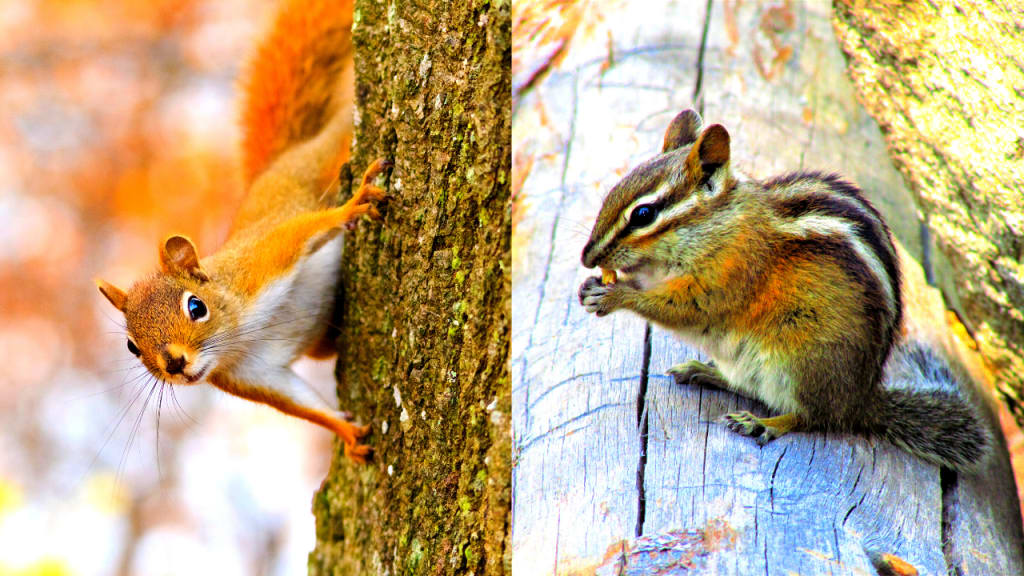
Squirrels vs chipmunks differences are often difficult to tell. Since they look closely alike, how do you tell them apart? What do they eat? Where can they be found? Can any be kept as a pet? And, of course, does anyone pose danger to you? Let’s take a look.
What is a Squirrel, and what is a Chipmunk?
- Squirrel: Squirrels are small mammals with bushy tails. They feed on seeds and nuts and are mostly found on trees. But there are also ground squirrels and even flying squirrels. They are from the Sciuridae family.
- Chipmunk: Chipmunks are small terrestrial mammals. They love burrowing and predominantly consume nuts. They are also from the Sciuridae family and predominantly have stripped fur.
You may have identified some differences. For instance, you might have concluded that Squirrels have bushy tails and that Chipmunks don't. Or that Chipmunks are predominantly terrestrial mammals while squirrels live on trees, land, and even fly.
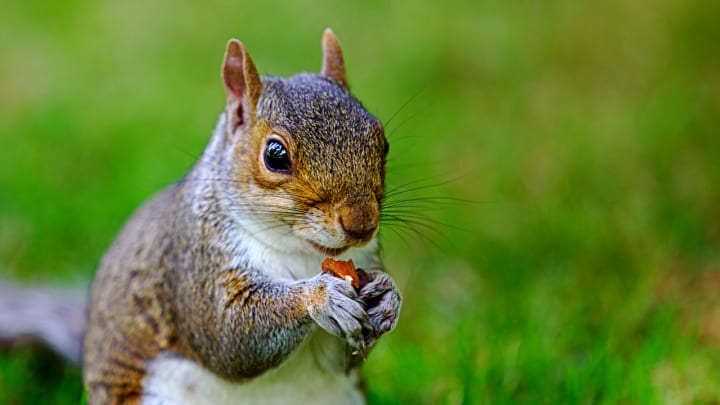
Well, you have given it a good try, but Squirrels vs Chipmunks understanding transcends this. They share a lot of differences beyond their physical appearance. Let's look at some of the things that will point you to these differences. So, here we go, Squirrels vs Chipmunks.
What to know about their habitat
Squirrels are both terrestrial and arboreal. That means you can find some on trees, as well as on land. They live mostly in parks or woodlands, building their nests on tree branches. These nests serve as a protective shield from predators and help them keep and nurture their young ones.
Chipmunks are predominantly terrestrial mammals, and they live in burrows. You can find them in deserts, mountains, and forests. Because they live in burrows, they can easily make tunnels to keep their young ones and store their food. Also, the burrows and tunnels protect them against predators.
Is there a difference in size?
Squirrels have a body size of about 9 – 12 inches in length. They also have tails that may be as long as 12 inches. Squirrels also weigh between 1 and 1.5 pounds. Making them heavier than Chipmunks.
Chipmunks are about 3 – 5 inches in length. Their tail size is about 3 – 5 inches too. Chipmunks weigh between 1 – 5 ounces.
What do both look like?
Squirrels typically have brown or grey furs on their back and heads. They also have white furs on their belly. Most arboreal squirrels don’t have stripes. However, it is not uncommon to find stripes on ground squirrels. These stripes make them look closer to a chipmunk. However, the difference is that, unlike chipmunks, these stripes don’t extend to their head.
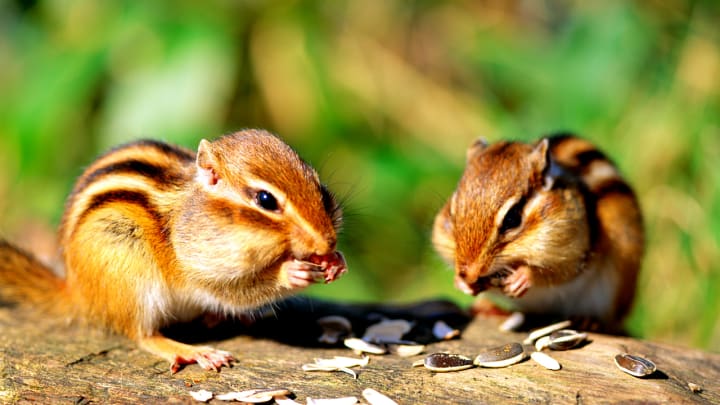
Chipmunks typically have brown furs covering their body. In addition, they predominantly have stripes on their side and back, which are often white and black. Their stripes extend to their head.
What do they eat?
Squirrels are largely categorized as herbivores. They eat more nuts and insects. They also eat what is most plentiful around their habitat, depending on their environment.
Chipmunks eat nuts and seeds and sometimes feed on insects' eggs, small snakes, and berries. Also, chipmunks eat as many things as they can find in their environment. They are sometimes categorized as omnivores.
How long does each live?
Squirrels can live as long as twelve (12) years in the wild. Many scientists have attributed this longevity in life span to their agility. More so, they are largely tree mammals, so they can easily climb up trees and escape from their predators.
Chipmunks can live up to six (6) years in the wild. However, unlike squirrels, chipmunks live predominantly on the ground and are more exposed to predators. Besides, compared to squirrels, chipmunks have more predators.
Which causes more damage?
If you are looking for a nuisance, you better pick squirrels. Squirrels are known to cause a lot of trouble. Their ability to bite just about anything has caused different power outages when they bit off power cables. They are also known for attacking bird seeds and people's attics.

Chipmunks, on the other hand, are cute-looking animals and they don't pose as much trouble as squirrels do.
Does “Squirrels vs Chipmunks” mean they both are enemies?
Seeing squirrels vs chipmunks, you might think these two little animals are enemies or don’t get along. Well, they are not necessarily enemies. But you can hardly see them together.
What they eat, where they live, and how they fetch their food are quite different. They are hardly competitors. Neither are they friends. The best way to describe them is that both are minding their businesses.
Can you keep Squirrels and Chipmunks as pets?
You may have noticed one or two squirrels in your backyards, and you feel the urge to keep them as pets. Well, read this before you do.
Squirrels are not usually domesticated and are not good as pets. In fact, in some states, it is illegal to keep squirrels as pets. If it’s not illegal in your state, you may want to talk to a veterinarian before you domesticate it.
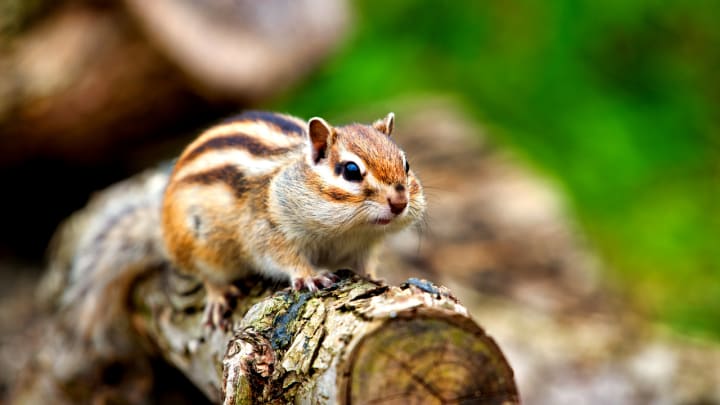
Chipmunks are quite cool, so they are likely to attract people who want small mammals as pets. However, while you can keep a chipmunk as a pet, the chipmunk may not enjoy it. The reason is that chipmunks are timid and often enjoy their own company. Besides, they may get defensive if they feel threatened. So, if you have children around you, you may want to be careful.
Aside from this, keeping a chipmunk requires lots of space with different settings which you may have to design with trees, pipes, etc. Besides, chipmunks can easily burrow, so you want to watch the kind of place you keep them.
Conclusion
When considering squirrels vs chipmunks, there are a whole lot of differences. Their habitat, size, appearance, and what they eat are different.
The next time you come across a squirrel-looking chipmunk, you should remember this “squirrels vs chipmunks” article. And hopefully, you will have no difficulty telling the difference.


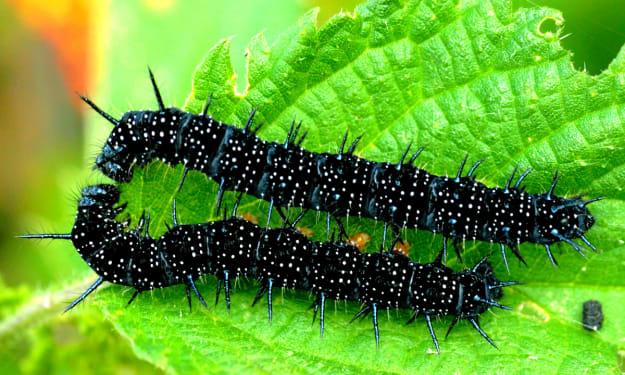



Comments
There are no comments for this story
Be the first to respond and start the conversation.